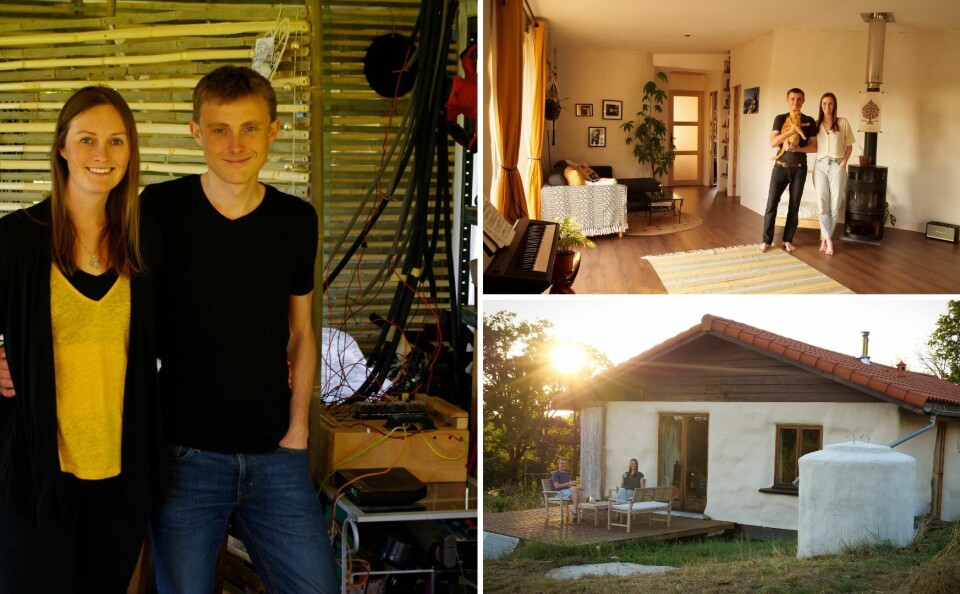-
More communes in France distribute Asian hornet traps
Residents are increasingly receiving help, with now the best time to capture the queens
-
Drinking tap water restricted for children in south-west France communes
Haute Garonne prefecture says the measure is precautionary and due to high chlorate levels
-
How I managed to cut the cost of energy bills at my French home
Connexion reader Anthony Powell embraced renewable solutions in years-long renovation project
Couple who built a straw bale house in France share their one regret
The Britons have reduced their annual energy bills to €500 by living off-grid and want to pass on the lessons they have learnt

A couple who built an off-grid house out of straw bales have seen their total energy bills fall to just €500 a year.
Britons Daniel Colman, 39, and Felicity Lee, 38, have been living in the property in north Charente for more than four years. They first featured in The Connexion in 2019, explaining how they had built the home for €30,000, plus €20,000 for the land.
By that point, all the basic systems for water, waste disposal and electricity were in place, but the interior had yet to be finished.
Made solar panel battery from old laptops off eBay
The couple, both teachers, had no background in construction but were inspired by a three-day course in Brighton on how to build a straw house on a foundation of old tyres.
They now believe they have enough experience of off-grid living to share their knowledge with others.
“Four years down the line, we are still very happy with what we have built, and we have improved several things,” said Daniel.
“With the electrical system, for example, we still use the same battery to store electricity from solar panels but it is now the back-up battery, and I have built a new, larger one, which we use all the time.
“Only in winter, after lots of short dark days, do we have to switch over to the reserve battery.”
Daniel built the new battery the same way as he did the first – by buying old laptop batteries off eBay, testing them and then connecting them together.
Read more: Rise in solar panel scams in France and how to spot the tricks
Written a book on building rainwater tanks
Similarly, they now have two rainwater collection tanks instead of one, both built out of steel rebar, chicken wire and hand-applied concrete.
“It works perfectly, even in the drought last year,” said Daniel.
The water tanks are probably the easiest part of the off-grid system for people to build themselves, and the couple wrote a book explaining how they did it.
“The system we used to build the tanks is very labour-intensive, which is why you do not see many of them around, at least not in western economies,” said Daniel.
“But if you have the time and commitment, it is something most people can do. For us, for the two tanks together, the cost of building our own was still significantly lower than what we were quoted to be hooked up to the public water supply.”
Read more: Practical tips for buying rainwater collector as sales surge in France
Utility bill is €500 a year
Other changes have included buying a cold-water washing machine, which means they no longer wash all their clothes by hand.
“Overall, our utilities bill, which basically comprises cooking gas and wood for heating, is around €500 a year. It’s wonderful because we can live well on relatively little money.
“It means we wash clothes when the sun is shining and there is lots of power from the grid, but that is something we are used to.”
The one part of their lives that is not off-grid is their fibre-optic internet connection, which allows them to continue working as English teachers, mainly for Asian students.
The couple recently spent three months in Asia, where Felicity got a yoga qualification and Daniel qualified in Thai massage. During their time abroad, the house was occupied by friends.
“We spent a couple of days with them before we left, explaining how things worked, and were a bit worried that we had just become used to living with a level of discomfort, and they would find it hard,” said Daniel.
“However, there were no problems at all during our time away and they loved it, which was reassuring.”
Regret not installing shutters at the start
He said one small regret was not including shutters in the original building – they cannot be added to the straw walls afterwards.
“During the heatwave, after two or three days, the house did get hot inside, because the windows are positioned to help heat the house in the colder months.
“We solved it by building some bamboo and fabric shades, which we open and close like shutters. If we did it all again though, we would probably include shutters from the start.”
The couple post regularly about the house on lesvignesbasses.org, and are also hosting weekend courses this autumn to pass on their experience.
Priced at €250 per person, courses promise an introduction to some of the practical aspects of straw houses and off-grid living.
The biggest advantage, for Daniel, is the tranquillity his new life affords.
“What I like most about the house is that it is so quiet inside,” he said.
“Because we have so few electric appliances, the plumbing system is simple, and straw is such a good insulator, it is very peaceful. It’s a bit of a shock when we stay elsewhere.”
Related articles
‘We travel slowly through France in our tiny horse-drawn caravan’
‘€8,000 barge in France gave us an off-grid retirement’
‘We built a €120,000 eco-house for a thrifty retirement in France’
























